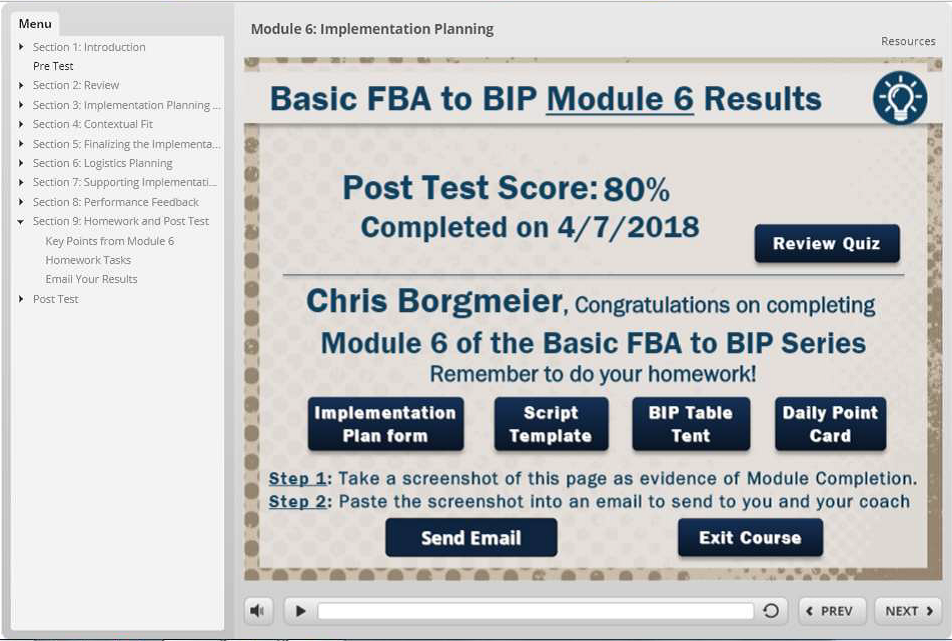-
<h1 style="text-align: center"><span style="color: #ffffff"><strong><u>Basic FBA to BIP</u></strong></span></h1> <h2 style="text-align: center"><span style="color: #ffffff"><strong>Professional Development Planning</strong></span></h2> <p> </p> <h4 style="text-align: center"><span style="color: #ffffff">Training is necessary, but insufficient.</span></h4> <h4 style="text-align: center"><span style="color: #ffffff">It's critical to pair Basic FBA to BIP training with coaching and technical assistance.</span></h4> <p> </p>
School District, Regional or State Planning
School District, Regional and and State Professional Development Planning
Implementing Tier 3 systems and individualized behavior support is complex, significantly more complex than implementing Tier 1 and Tier 2 supports. Accordingly, a more intensive professional development plan is necessary to build the skills necessary to address the complexity of students requiring individualized behavior support. Below are resources for guiding school districts in development of a strong professional development plan for using the Basic FBA to BIP e-learning modules. You may want to begin with the Basic FBA to BIP District Planning & Implementation Guide as a resource.
District Planning: Basic FBA to BSP
An effective professional development plan starts at the school district level before moving in to training and implementation with schools. We have provided the Basic FBA to BIP District Planning & Implementation Guide to assist in this process and you can also watch the District Planning video embedded here.
Before thinking about training with the Basic FBA to BIP modules, we encourage you to first think about coaching support.
Coaching Capacity: Identify district-level staff, most of district-level Behavior Specialists, who are fluent in FBA and BIP. We encourage you to think about how to redefine the role of the Behavior Specialist to include coaching and capacity building in schools. The Behavior Specialists should take the lead supporting schools with implementation of Basic FBA to BIP by helping schools to organize training and providing ongoing coaching and support to school-level participants in the Basic FBA to BIP Behavior Specialist Training.
Training Capacity: The Basic FBA to BIP e-Learning modules offer school districts flexibility when it comes to training. School districts can use the e-Learning modules or they might have district-level Behavior Specialists with expertise in FBA/BIP deliver the trainings using the Live Training materials. School districts will want to decide which training format will work best. School districts will then want to set a training schedule, we suggest a schedule of one training every two weeks, this should give participants time to complete homework assignments between modules. When using the e-Learning modules we encourage you to consider having participants come to a common location to complete the trainings at a set time. Opportunities for discussion and to answer questions can be helpful as participants progress through the training module. The Basic FBA to BIP e-Learning Modules Planning & Coaching Guide is a nice resource that provides a closer look at the training modules and coaching tools.
Evaluation Capacity: School districts are encouraged to think about ongoing evaluation to assess the effectiveness of training on implementation of Tier 3 systems and Basic FBA to BIP in schools. We encourage district coaches to provide feedback and evaluation on the homework tasks for each module using the Basic FBA to BIP Coaching Checklists (linked below). It is also recommended to have schools regularly assess implementation of Tier 3 systems.
Here are links to recommended measures, which are available through PBIS Apps:
Tiered Fidelity Inventory (TFI) (Tiers 2 and 3) Monitoring Advanced Tiers Tool (MATT)
Benchmarks for Advanced Tiers (BAT) FBA and BIP Technical Adequacy Tool for Evaluation (TATE)
Identifying and Supporting Schools
An important step in successful implementation is selecting schools that are ready and committed to implement Basic FBA to BIP. Schools should clearly understand what they are committing to before beginning Basic FBA to BIP training. The School Readiness & Commitment form (pdf) is a tool that can be used to assess a school’s readiness for Basic FBA to BIP. District coaches should use this form as s guide to ensure school’s are ready and that the school has identified appropriate staff to participate in the training. Staff members who will have the capacity to carry out the Basic FBA to BIP practices.
- Provide regular prompting, encouragement and reminders to complete each Basic FBA to BIP e-Learning module.
 Collect evidence of completion by having participants send you a copy of the Results Page (see example embedded here).
Collect evidence of completion by having participants send you a copy of the Results Page (see example embedded here).- Provide an opportunity for follow-up discussion to answer questions that may have come up while completing each module.
- Provide regular prompting, encouragement, reminders and support to complete the homework tasks for each module. The goal is to complete homework tasks for each module before moving on to the next module.
- Collect the homework tasks and provide feedback.
- Coaching Checklists are provided with each module for providing feedback. It’s helpful to provide direct written feedback on to a copy of the documents submitted for the homework task as well as provide feedback scores with explanations on the corresponding Coaching Checklist.
Below are links to the Coaching Checklists for each module
- Module 2 – FBA Interview Coaching Checklist (pdf)
- Module 3 – FBA Observation Coaching Checklist (pdf)
- Modules 4 & 5 – Behavior Intervention Plan Coaching Checklist (pdf)
- Module 6 – Implementation Plan Coaching Checklist (pdf)
- Module 7 – Evaluation Plan Coaching Checklist (pdf)
- Module 7 – BIP Review Meeting Coaching Checklist (pdf)